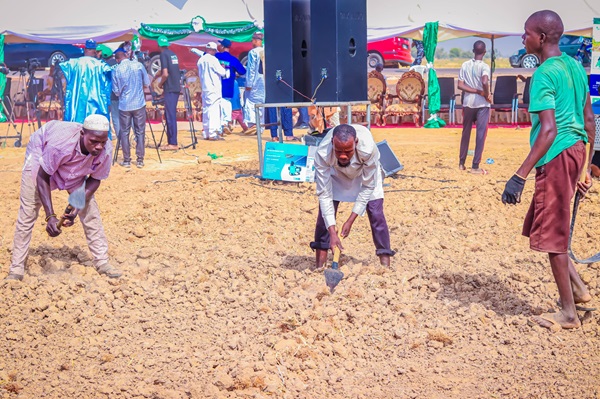
In response to Nigeria’s burgeoning population and the pressing need to feed its growing populace, President Bola Tinubu’s administration has declared a state of emergency in the agricultural sector. The Federal Government has launched the dry-season farming initiative as part of a comprehensive strategy aimed at ensuring year-round farming and bolstering food production.
This initiative, implemented during the 2023/2024 dry season farming period under the National Agricultural Growth Scheme and Agro-Pocket Project (NAGS&AP), has already demonstrated a notable improvement in the agricultural output of farmers. In recognition of the significance of such programmes, the government is actively collaborating with state governments to further implement and expand this scheme.
The Federal Ministry of Agriculture and Food Security, as the implementing institution, has extended letters of interest to numerous state governments, seeking their partnership in enhancing the productivity and welfare of rural farmers.
Federal Government’s Intervention
Following the launch of the dry season farming initiative under NAGS&AP, the Federal Ministry of Agriculture and Food Security has hosted several state governors, facilitating discussions to solidify partnerships with the Federal Government. These collaborations aim to boost each state’s agricultural productivity through the implementation of the scheme.
The Minister of Agriculture and Food Security, Senator Abubakar Kyari emphasised the initiative’s dual purpose during a stakeholders meeting in Abuja. The objectives include providing essential inputs for priority crop production to support farmers and offering institutional support to improve overall performance.
Although he acknowledged lapses in the initial implementation, Kyari highlighted the need for a comprehensive evaluation to address challenges and prevent their recurrence. During a meeting with state governors, including AbdulRahman AbdulRazaq of Kwara State, Lucky Orimisan Aiyedatiwa of Ondo State, Agbu Kefas of Taraba State and Ahmed Usman Ododo of Kogi State, Kyari revealed that implementation guidelines for the upcoming second phase have been reviewed to address challenges from the first phase.
Key guidelines include the establishment of a NASG-AP state working committee, chaired by the executive governor or their representative. Kyari stressed the active involvement of sub-national governments to ensure sustainable agricultural production and the realisation of President Bola Ahmed Tinubu’s interconnected eight-point agenda.
As the second phase expands nationwide, the minister urged state governors to prepare their respective states for optimal participation in cultivating rice, maize and cassava. Criteria outlined include the availability of prepared land, irrigable lands owned by verified genuine farmers and full state participation throughout the entire agricultural chain. This collaborative effort between the federal and state governments signifies a crucial step towards achieving food security in Nigeria.
State Governors’ Commitment
During a recent visit to the Federal Ministry of Agriculture and Food Security, AbdulRazaq passionately advocated for the ministry to assume the role of the sole administrator of agricultural programmes in Nigeria. He stressed the urgency of addressing food security concerns and leveraging dry-season farming initiatives. AbdulRazaq believes that designating the ministry as the “one-stop-shop” for agricultural programs would streamline interventions, resulting in more impactful outcomes.
The governor emphasised the significance of the dry-season farming program, particularly focusing on staple crops such as rice, cassava, and maize. He underscored the urgency of improving agricultural yields to meet the demands of Nigeria’s population and envisioned a future where Nigeria becomes a food exporter to the rest of West Africa. AbdulRazaq highlighted the ministry’s program, which concentrates on rice, cassava, and maize, expressing the need to urgently improve yields to meet the growing demands of the Nigerian population.
In a similar vein, the governor of Nasarawa State, Engr. Abdullahi Sule reaffirmed his state’s commitment to supporting farmers by doubling the distribution of fertilisers from 13,000 to 26,000 bags. This proactive measure aims to alleviate the challenges faced by farmers due to the high cost of living. Sule emphasised the government’s readiness to support smallholder farmers, thereby enhancing production and reducing pressure on foreign exchange.
Governor Mohammed Bago of Niger State highlighted his administration’s success in attracting over $1 billion in investment for agricultural mechanisation and technology within the past six months. Stressing Niger State’s abundant resources, including arable land, water resources and dams for agricultural purposes, Governor Bago expressed optimism about the state’s agricultural potential. He revealed that Niger State had allocated one million hectares of land to the Federal Government for the upcoming 2024 dry season farming, positioning the state as a pilot for agricultural development in Nigeria.
During his visit to the ministry, Governor Dr. Mohammed Idris of Kebbi State announced that the state had purchased N2.8 billion worth of fertilizer and distributed it free to farmers, resulting in a bumper harvest. The state additionally acquired 6,000 solar pumps worth N5 billion, to be distributed free to farmers in the coming weeks to further boost dry-season farming. Idris expressed the state’s commitment to addressing food security challenges and sought collaboration with the Federal Ministry of Agriculture and Food Security to enhance food production.
Governor Biodun Oyebanji of Ekiti State urged the ministry to explore areas of collaboration and shared initiatives from his administration, including the updating of the farmers’ database and efforts to change farmers’ orientation towards viewing farming as a business. Oyebanji stressed the untapped potential of agriculture in Nigeria and called for collective efforts to ensure food security in the country.
Several other state governors, including those from Jigawa, Sokoto, Kogi, Taraba, Nasarawa and Ondo, have also visited the ministry, underlining the widespread commitment to collaboration between state and Federal governments in advancing agricultural initiatives.
The unveiling of guidelines for the second phase underscores the government’s commitment to addressing challenges and ensuring the success of dry-season farming initiatives nationwide. The National Agricultural Growth Scheme’s goal to increase total food production and make agricultural commodities affordable aligns with the collective effort to achieve food security and sustainable agricultural development in Nigeria.


